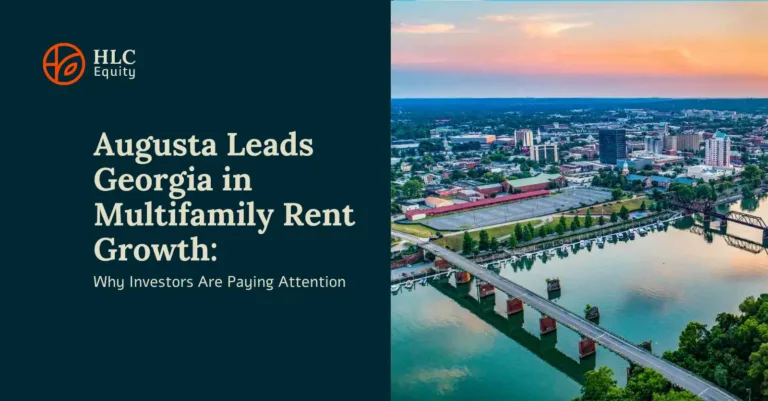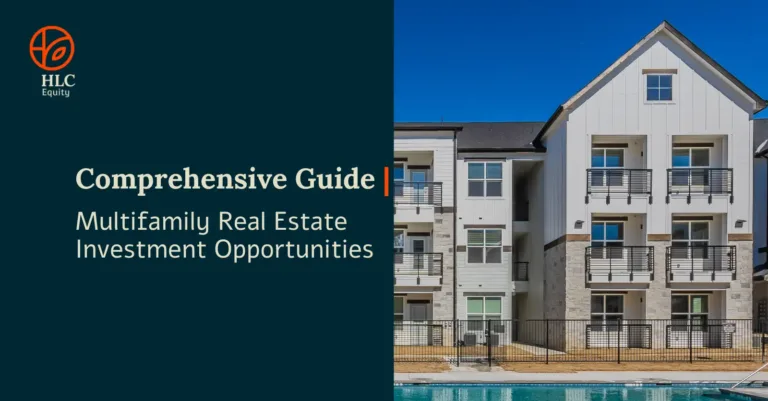
HLC EQUITY
In this dynamic era of real estate investing, the landscape has evolved over the past decade through the emergence of Real Estate Crowdfunding Platforms, which provided new avenues for accessing real estate projects, proverbially “democratizing” the space. This article compares key differences between the various “deal platforms” and the more traditional owner/operator investment management model.
It’s undeniable that the emergence of real estate crowdfunding has significantly transformed the landscape of commercial investing. Traditionally, investing in commercial real estate was limited to wealthy individuals or institutional investors. Once an asset class reserved only for the elite, most wealthy individuals would identify investment opportunities through their personal and professional networks, whether that be the country club or other social circles. However, with the advent of crowdfunding platforms, barriers to entry lowered, allowing a broader range of retail investors to participate.
Real estate crowdfunding leverages the power of digital technology to pool capital from numerous accredited investors to fund various commercial projects, such as office buildings, retail spaces, and apartment complexes. Born out of the JOBS ACT in 2012, this legislation allowed for syndication companies to offer these investments. Title III of the JOBS ACT, also known as the Crowdfunding Act, has drawn the most attention because it empowered companies to issue securities by way of crowdfunding, something that was not previously permitted. This newfound access to commercial real estate opportunities has, on the one hand, provided investors with greater diversification options, but has also enabled sponsors to secure funding more efficiently and dynamically. This trend has reshaped how investors engage in the world of commercial real estate and has also provided additional liquidity to the market. But it’s not without its downside – especially with shifts and tightening of the economy.
As many of these crowdfunding platforms face new challenges, several high-profile players have been in the news as they have either faltered or been acquired by better capitalized companies. In some cases, mismanagement and even fraud have been reported. Many of these platforms received Venture Capital funding from large investors, which allowed them to enjoy accolades over the past decade, but simultaneously the led to some unforeseen obstacles for these platforms.
Experience, Legacy, and Sponsorship
A fundamental challenge native to these platforms is their youth, and the lack of storied heritage that engenders investor trust. Operating as intermediaries between sponsors and investors, these platforms offer a diverse array of projects. Yet, their relative lack of proven experience might lead to investor skepticism. Often they rely heavily on consistent deal flow to sustain their operations; however, during market downturns, the availability of high-quality projects diminishes, potentially causing a decline in investor engagement.
In selecting a strong investment partner, you will want to seek out one who is anchored in their consistent ability to identify valuable properties, execute meticulous due diligence, and provide reliable returns, while always having their own capital at risk in every transaction they invest in, otherwise known as “skin in the game.”
Due Diligence and Risk Management:
The bedrock of deal success for experienced real estate investors and managers lies in exacting due diligence procedures and comprehensive risk management strategies, while also having the knowledge and resources to correct situations when investments have challenges (which they often do). Without this, you’re simply rolling the dice. Private investors are best served by partnering with real estate owners and operators who scrupulously examine potential projects – upwards of 100 per month –assessing financial viability, market trends, property conditions, and other pivotal factors. This approach ensures top deal quality and minimizes the possibility of subpar investments.
Investment owners and operators are constantly in contact with local and national brokers and other service providers who offer deep industry knowledge. Additionally, quality investment groups have their own portfolio to lean on and inform their operational capabilities when performing due diligence.
Juxtapose this against many of these platforms, which rely heavily on “sponsors” – or third-party operators – to bring them deal flow and inform their investment decisions.
Platforms thrive in presenting investors with options, diversity, and access to a multitude of projects. That may sound appealing, however one key fact remains: the principals of the platforms are not personally invested in those deals. Additionally, the scale and reliance on technology often encumbers their capacity to conduct the same thorough analyses that experienced firms can offer. Cons
Investor Relations and Alignment of Interests
Real Estate Crowdfunding Platforms employ digital technology to bridge the investor-sponsor gap, fostering a more superficial, transactional relationship vs. a genuine one. While this digitization set the stage to attract significant Venture Capital, from the vantage point of a real estate investor, the absence of personalized interaction might compromise the depth of understanding that investors possess concerning projects and overall investment experiences.
Private real estate investors commit to unwavering transparent communication and the alignment of interests with investors. Investors should seek out a personalized approach, with direct access to the asset and property management teams, fostering a genuine sense of partnership. Furthermore, investors should only invest in deals in which the firm principals personally invest, an embodiment of the alignment that underscores a mutual commitment to success.
Challenges with a “Middle Man”
The business model of these platforms is fundamentally based on deal volume – a constant flow sustains their “hyper growth” Venture-backed business plan. That business model over the past decade has led to lower investment standards as these platforms are generally paid based on a percentage of deals that are brought into the platform. This is one of the key factors behind the current challenges that many of these platform’s face.
Real Estate owners and operators, however, generate sustained cash flow from investment revenue and management fees, which allows them to be more selective for a longer period, selecting only the best investments they come across.
Market Volatility and Deal Flow:
These platforms grapple with unique challenges during market contractions. Due to their reliance on deal flow to collect fees, in a declining market where transaction volume diminishes, these platforms might struggle to identify projects that maintain investor engagement. Likewise, the quality of deal flow becomes even more questionable, as these platforms continue to collect their fees. The emphasis on volume for revenue might pressure prioritizing deal quantity over quality, potentially resulting in suboptimal investment opportunities for their investors.
During these times, private real estate investors are best served by partnering directly with owners and operators with experience that span many cycles, coupled with a rigorous approach to project selection and due diligence. This allows them to adeptly navigate changing market conditions, leaning on their experience, process, and protocol. Industry knowledge enables owners and operators to make informed decisions, mitigating risks associated with market downturns.
When considering an investment partner, it’s critical to ask the right questions. Here is a list of questions compiled for private investors.
- How much of your group’s principal’s personal capital is invested in each project? Do you really have skin in the game?
- How many properties/units/projects does your group currently own and operate?
- What risk-mitigation strategies are in place to help your investor partners?
- Is your group’s business model reliant on making origination fees on each project?
- What management fees do you charge?
Investor Note: Cheaper does not always mean better and like other things in life, you get what you pay for. Higher management fees may translate into a higher service level and may be done so for worthwhile reasons. Make sure management fees and any origination fees are transparent and that there is a solid alignment of interests. - How many years has your group been in business?
- Give one example of an investment that your group invested in that has underperformed or been challenged. What did you do to overcome the situation?
- How do you operate your investments? Do you directly own and operate? Do you utilize third party property management?
- What is the added value of investing with you compared to some of your peers?
- Who underwrites your deals? What data do they use for their analysis?
Conclusion
The fundamental make up of owners and operators sharply contrasts with challenges that confront many Real Estate Crowdfunding Platforms. While they provide a new and distinct solution to democratize real estate investing, they are fundamentally built for sunny days. There are some crowdfunding platforms that have performed well, even during these challenging times. While the overall model remains challenged, it is feasible that with time and maturity these platforms will offer a viable solution. However, nothing can replace the reputation, stringent due diligence, personalized investor relations, and risk management expertise of established real estate sponsors that deliver investment opportunities that can ebb and flow with market conditions, while still having investor success at the forefront.


